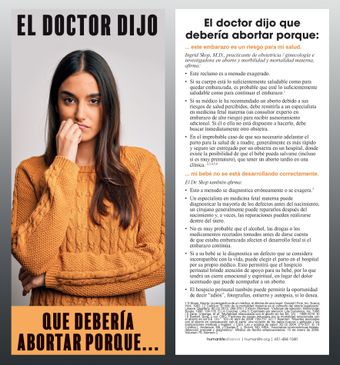4. The Doctor Said I Should Have an Abortion Spanish Fact Card
Written by Sidewalk counselor, Tony Hartman and OB/GYN, Dr. Ingrid Skop, this is a powerful tool to dispel any false claims about abortion that pro-choice medical professionals may have. 4 x 9 inch card.
Text On Card:
The Doctor said that I should have an abortion because:
...this pregnancy is a risk to my health.
Ingrid Skop, M.D., practicing OB/GYN and researcher in abortion and maternal morbidity and mortality, states:
This claim is often exaggerated.
If your body is healthy enough to get pregnant you are probably healthy enough to continue the pregnancy.1
If your doctor has recommended an abortion due to your perceived health risks, he or she should refer you to a maternal fetal medicine specialist (an expert high risk pregnancy consultant) for additional counseling. If he or she is unwilling to do so, you should immediately find another obstetrician.
Abortion is not proven to be safer than childbirth.2
In the unlikely event that delivery is necessary for a mother’s health, it is usually quicker and safer to be delivered by an obstetrician in a hospital, where there is a chance the baby can be saved (even if very premature), than to have a late term abortion in a clinic.3,4,5,6,7
...my baby is not developing properly.
Dr. Skop also states:
This is often misdiagnosed or exaggerated.8
A maternal fetal medicine specialist can diagnose most defects before birth, a surgeon can usually repair these after birth and sometimes repairs can be performed in-utero.
Alcohol, drugs or prescription medications taken early before you realized you were pregnant, are not very likely to affect fetal development if the pregnancy continues.
If your baby is diagnosed with a defect thought to be incompatible with life, you can choose delivery in the hospital by your own doctor. This will allow perinatal hospice to provide supportive care for your baby, so you will have emotional and spiritual closure, rather than the accentuated grief that may accompany an abortion.
The perinatal hospice may also allow the opportunity for saying “good-bye,” photographs, burial and autopsy, if desired.



